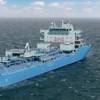The Baltic Exchange's main sea freight index, which tracks rates for ships carrying dry bulk commodities, spiralled downwards to its lowest level in nearly three decades as rates for all the four vessel types continued to flounder.
The overall index, which gauges the cost of shipping resources including iron ore, cement, grain, coal and fertiliser, was down 34 points, or 5.11 percent, at 632 points, the lowest since August 1986. The index is also seen by investors as an indicator of global industrial activity.
Brokers said the dry bulk market was expected remain in the doldrums due to weak commodity demand at present especially from top global importer China.
"Dry bulk remains under pressure across all segments on the back of very thin spot demand," Omar Nokta of Clarkson Capital Markets, said.
Weak demand for commodities, such as iron ore, has put pressure on smaller, higher-cost producers and this has taken its toll on the dry freight market.
"We believe that despite softer prices/margins, low cost Australian producers will continue to meet targeted production with negative implications for dry bulk tonne-mile demand," Wells Fargo Securities analyst Michael Webber said, referring to producers such as Rio Tinto and BHP Billiton.
Tonne miles are a key indicator of shipping demand, measuring the volume of the transported cargo multiplied by the distance of the voyage.
The capesize index shed 60 points, or about 7.64 percent, to 725 points.
Average daily earnings for capesize vessels, which typically transport 150,000-tonne cargoes such as iron ore and coal, declined $364 to $6,992.
The panamax index was down 70 points or 11.29 percent at 550 points. Average daily earnings for panamaxes, which usually carry coal or grain cargoes of about 60,000 to 70,000 tonnes, slid $555 to $4,392. Both are at its lowest levels since June 27, 2014.
The supramax index was down 19 points at 599 points, while the handysize index slipped 8 points to 348 points.
(Reporting by Jonathan Saul, Vijaykumar Vedala and Kevin Jose , editing by William Hardy and Jane Merriman)













